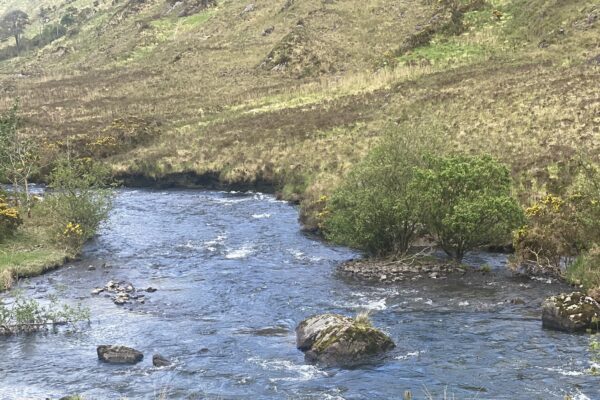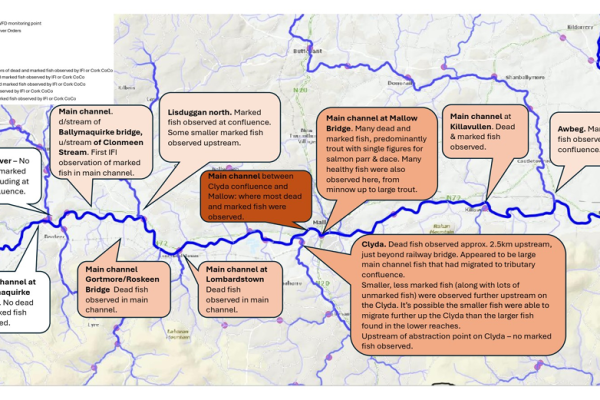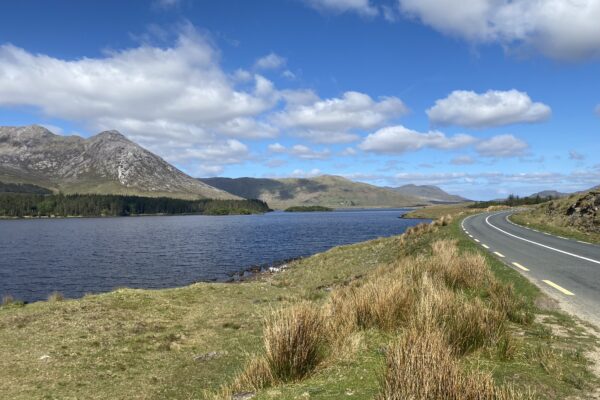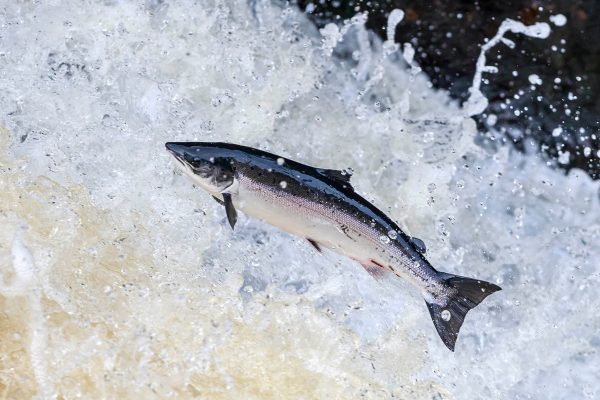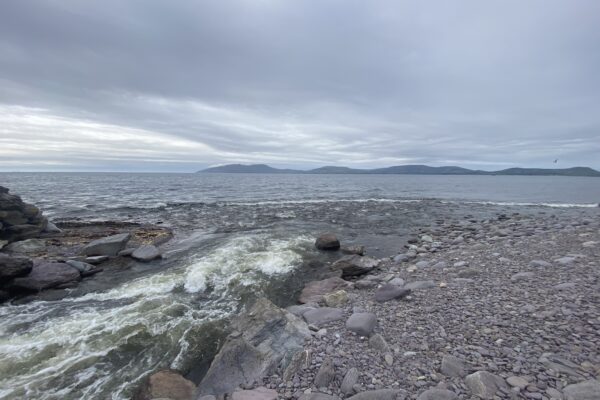-
Gearhies Bantry Bay Submission – Salmon Watch Ireland
Salmon Watch Ireland (SWI) submits that aquaculture licences T05/122 and T05/122A cannot lawfully be renewed. The application by Murphy’s Irish Sea Food fails to meet fundamental requirements under the Habitats Directive, Water Framework Directive (WFD), EIA Directive, and the Nature Restoration Law, and does not remove the scientific doubt necessary to permit authorisation. Legal Compliance Not Achieved • Article 6(3) of the Habitats Directive requires no reasonable scientific doubt of no adverse effects on SACs—this threshold is not met. • Article 6(4) cannot apply: no imperative reasons of overriding public interest (IROPI) exist. • Under the WFD, any deterioration of High-Status waters is unlawful outside narrow exceptions that are not invoked here. • Irish case law (Connelly, Kelly, SWI v ALAB) confirms that consent cannot be granted where scientific uncertainty persists. Full Text Here
Continue reading -
Newsletter Re: Exploitation – Number 24
We are pleased to announce the release of our latest Wild Salmon Conservation Newsletter, which presents the initial key themes, priorities, and actions identified through public feedback on how best to manage exploitation and implement effective policies to increase wild smolt production and improve adult salmon returns. The newsletter highlights the issues that matter most to anglers, conservationists, and local communities—including enforcement, habitat restoration, marine survival challenges, aquaculture concerns, and the urgent need for coordinated action across agencies. Your input has been invaluable, and this summary reflects the collective voice of those committed to protecting Ireland’s wild salmon. We encourage you to read it, share it, and continue engaging as we move forward with stronger advocacy and evidence-based policy proposals. If you have any comments or wish to contribute further, we’d be delighted to hear from you. The survey is still live and you are welcome to contribute if you have not done so. Thank you for your continued support and dedication to safeguarding our wild salmon. Wild Salmon Conservation Newsletter Number 24
Continue reading -
Conference Proceedings – Salmon Watch Ireland, Athlone 11 October 2025
This special conference edition — “Protecting Wild Salmon: Science, Stewardship, and Accountability” — captures the key discussions and outcomes from our 2025 Athlone Conference. Inside you’ll find: Science and Survival: Dr. Elvira de Eyto on seven decades of data from Burrishoole, and Dr. Paddy Gargan confirming the clear link between sea lice and salmon mortality. Grassroots Action: Maura Brennan’s Nore Vision project showing the power of community-led stewardship. Policy and Law: Emma Armshaw (SWAN) on the incompatibility of open-net salmon farming with EU clean-water directives. A Call to Action: From pollution reporting to citizen science — discover how you can make a difference. Thank you for your continued support in protecting Ireland’s wild salmon. Newsletter Number 22 Final
Continue reading -
Deenish Island – ALAB Determination – Letter to Minister Heydon DAFM
Dear Minister Heyden, On behalf of Salmon Watch Ireland, I write to express our profound concern at the recent determination of the Aquaculture Licences Appeals Board (ALAB). The decision, in our considered view, undermines the protection of Ireland’s wild Atlantic salmon and sea trout and fails to uphold the standards required under Irish and European law. The determination highlights a deeply troubling reality: operators, despite having breached and continuing to breach the terms and conditions of their licences, appear able to operate without sanction. This sets a dangerous precedent, erodes public confidence in the regulatory process, and calls into question the integrity of environmental governance. We are further concerned that: The impacts on wild salmon and sea trout populations, particularly within the Waterville system and other iconic fisheries, were not adequately assessed. The implications for angling tourism — a vital contributor to rural economies — were ignored. Key inspections were delayed, raising doubts as to whether site-specific environmental risks were properly evaluated. The recent transfer of salmon other than smolts, currently under investigation by your Department, raises serious compliance and biosecurity issues that underscore the need for stricter enforcement. Minister, you will recall that in 2019 your Department issued an enforcement order in response to similar breaches, ensuring that aquaculture operators were held to account. The present circumstances demand no less. A comparable order is urgently required to prevent further non-compliance and ecological damage. We must highlight the continuing reliance on Section 19A(4) of the Fisheries (Amendment) Act 1997, which permits aquaculture operators to continue operating under their original licence terms and conditions while renewals have been lodged. In its Deenish determination (AP1/2019), ALAB accepted that condition 2(e) of the licence had been blatantly breached. Harvesting almost four times the legal limit is not a technicality; it is a wholesale disregard for the terms of the licence. Yet ALAB concluded that revoking the statutory entitlement would be “disproportionate.” MOWI has previously sought to amend the terms and conditions of its licence; however, this request was refused by the State. Notwithstanding this refusal, the company has continued to operate in breach of its extant licence and remains in contravention of the legally binding terms and conditions governing its operations. The consequences of this are grave. Section 19A(4) can now be interpreted as a shield that allows operators who are in breach of their licences to continue farming under the protection of the "law", even while those breaches remain unpunished. No fines, no suspensions, no meaningful sanction. The State’s hands are tied, not because it lacks evidence, but because the appeal process itself provides cover for non-compliance. This decision shatters the authority of the Minister and the Department to regulate aquaculture. It tells every operator that licence conditions are little more than suggestions, that breaches can be bargained away, and that even blatant non-compliance carries no real consequence. It empowers those already inclined to disregard the law, while leaving local communities and fragile marine environments unprotected and at risk. The integrity of Ireland’s regulatory regime depends on the principle that a licence is binding and enforceable. But Section 19A(4), as it currently stands, makes a mockery of that principle. Until this provision is repealed, aquaculture operators will continue to enjoy a legal loophole that lets them operate outside the law, immune from sanction, and secure in the knowledge that environmental safeguards can be breached without consequence. The Government has previously undertaken to delete Section 19A(4). That promise must now be honoured. Every day this provision remains in force, the credibility of aquaculture regulation is eroded, public trust is lost, and Ireland’s environmental protections are sacrificed to a system that rewards non-compliance. This undermines public confidence in the regulatory system and creates the perception that aquaculture operators can operate above the law. The provision fatally weakens environmental safeguards by allowing ongoing activity despite established breaches. You have previously undertaken to remove Section 19A(4). We therefore respectfully ask: when will this deletion be implemented? Until this section is repealed, the public will continue to perceive that aquaculture operators can breach conditions without consequence, and that the State’s regulatory regime tolerates non-compliance. The ALAB determination also exposes Ireland to potential breaches of binding European legislation, including: The Habitats Directive (92/43/EEC), requiring the strict protection of species and habitats of Community interest. The Water Framework Directive (2000/60/EC), obliging Member States to prevent deterioration of aquatic ecosystems. The Environmental Impact Assessment Directive (2011/92/EU as amended by 2014/52/EU), mandating rigorous assessment of projects likely to have significant environmental effects. The ALAB decision appears inconsistent with the precautionary principle and threatens both Ireland’s natural heritage and our compliance with EU law. Without corrective action, there is a real risk of irreparable ecological harm and legal exposure at European level. Minister, we therefore respectfully implore you to initiate a judicial review of this ALAB decision, to issue a new enforcement order as was done in 2019, and to honour your commitment to delete Section 19A(4) without delay. We would welcome the opportunity to meet with you at the earliest opportunity to present detailed evidence of our concerns and to work constructively towards stronger safeguards for Ireland’s wild salmonid populations. Thank you for your urgent attention to this matter.
Continue reading -
Newsletter – Number 21-Blackwater Report
Today we’re sharing Salmon Watch Ireland’s Blackwater Report (Sept 2025). It summarises the Inter-Agency investigation into the August fish mortalities on the Munster Blackwater and sets out what must happen next. While we appreciate the efforts of all agencies and stakeholders it is none the less alarming that no definitive cause was identified. Whether this was the result of investigation taking too long to sample critical parameters or that event had occurred days before and had become non-detectable it should serve as a call to action by all to monitor and protect water quality. While we appreciate calls to actively restock these areas affected by the kill, we would suggest that natural recolonisation might be a better long term solution. What’s inside Up to 32,000 salmon and trout lost; oxygen levels normal; no single toxin identified. Macroinvertebrates rated Q4–Q5 (Good–High), pointing to a short-lived irritant — but on top of chronic nutrient enrichment. Strong enforcement measures urged, including indictment and licence suspension for persistent polluters, plus continuous monitoring of all discharges. Calls to reform the nitrates derogation, deploy real-time sensors, and build Irish lab capacity for pollutant & algal toxin testing.
Continue reading -
Launch of Salmon Watch Ireland’s 2025 Policy Statement – A Call to Protect Ireland’s Wild Atlantic Salmon
We are pleased to share with you Saving the Irish Salmon – Policy Statement 2025, Salmon Watch Ireland’s updated and comprehensive plan to safeguard one of our nation’s most iconic species. This revised policy builds on our original 2019 proposals and reflects the urgent challenges now facing wild Atlantic salmon. Numbers have fallen by approximately 90% since the 1970s, and without decisive action, salmon could become a rare sight in Irish rivers within our lifetime. The document outlines: The current crisis in salmon stocks, its causes, and the growing threats from climate change, habitat loss, pollution, overfishing, aquaculture impacts, by-catch and barriers to migration. A science-based framework for reversing the decline, focusing on habitat restoration, barrier removal, predator management, and stricter regulation of exploitation and aquaculture. Policy recommendations for government, agencies, communities, and international partners, including reforms to the Salmon Conservation Fund and the creation of an independent Aquaculture Authority. This is not just a policy document – it is a call to action. Protecting salmon will require leadership, cross-sector collaboration, and strong public support. We invite you to read the full statement, join the conversation, and help us in building the momentum for change. You can access the full policy document in the attached. While the policy document is comprehensive, we anticipate that the detailed management of Ireland’s salmon resource will need to evolve in response to emerging challenges, ensuring the strategy remains effective and delivers lasting results. Thank you for your continued commitment to Ireland’s environment and biodiversity. Together, we can ensure that future generations inherit healthy rivers and thriving salmon runs
Continue reading -
Newsletter Number 15 – 12 June 2025
NASCO – SALMON AT CRISIS LEVEL SALMON SURVIVAL STRESSOR ANALYSIS - IRELAND APPEAL FOR VOLUNTARY MEASURES CONSERVATION OF SALMON
Continue reading -
Newsletter Number 13 – 20 May 2025
This newsletter discusses the unique relationship between salmon and pearl mussel. It is in everyone's interest to know the link between these species and how we must keep habitat and water quality in a condition that supports vibrant stocks of both species. We also highlight the recent high temperatures and their potential effect on juvenile salmon. We have also provided a link to the Danish River Skyern and note that a declining trend in catches similar to UK and Ireland appears to be taking place.
Continue reading -
Newsletter Issue Number 12 – 11 May 2025
This newsletter deals with two issues which are of concern to all who support salmon conservation in Ireland. The first topic discusses the recent report from Inland Fisheries Ireland relating to the GeneFlow project which seeks to record the extent of introgression by farmed salmon into Ireland's rivers. The second issue discusses and focusses on the disasterous MSW salmon run in 2025 which follows another poor year in 2024. We are asking that all stakeholders adopt a reasonable approach to safe guard the resource. While the commercial sector is opening on 12th May and is quota restricted, it may be time to restrict fishing periods for these fisheries. We contend that commercial fisheries are not consistent with a proper management of the salmon resource and should be discontinued going forward. We are asking all the angling community to think before exploiting salmon above 65cm and to restrict their harvest.
Continue reading -
Newsletter Number 11 -Salmon Farm – Concerns
Salmon Watch Ireland Newsletter Deenish Island Aquaculture Update Urgent Concerns Raised by Salmon Watch Ireland Licence Breach: Introduction of Pre-Adult Salmon The recent transfer of fish to the Deenish Island site appears to breach key conditions of the extant aquaculture licence (AQ199). The licence strictly permits the introduction of smolts only—juvenile salmon—up to a cap of 400,000. The recent stocking of 406,450 pre-adult salmon, each averaging 2.155 kg, appears to represent a clear breach of this stipulation. This information was provided on foot of a request for AIE (Access to Environmental Information) to the Department of Agriculture, Food and the Marine.
Continue reading


